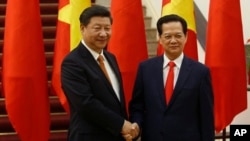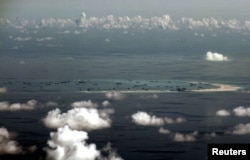Vietnamese lawmakers questioned Prime Minister Nguyen Tan Dung on Tuesday about Vietnam’s relations with China, including the issues of receiving aid and getting preferential loans from its northern neighbor.
In a question-and-answer session with Dung, broadcast live on state-run TV, lawmaker Truong Trong Nghia from Ho Chi Minh City said Vietnam’s economy tends to rely heavily on China “in many areas,” which threatens “Vietnam’s economic sovereignty.”
“Our voters ask us not to borrow loans from China at this time as Beijing has disputes [over the South China Sea] with Vietnam, invades Vietnamese territory and threatens to do more,” Nghia said as Dung looked on.
Nghia said that practice would put Vietnam in a difficult situation, if it decides to bring China to the international arbitration tribunal in the future.
Nghia’s questioning comes two weeks after one of Vietnam's largest financial institutions said it received $200 million in a five-year credit deal from the China Development Bank during Chinese President Xi Jinping’s recent visit to Hanoi.
China also has given Vietnam preferential loans worth more than $400 million to build an elevated railway project in Hanoi.
Decision-making power
However, Tuong Lai, former adviser to two Vietnamese prime ministers, said Vietnam’s strategies to deal with China do not rest on Dung only, given the country’s political circumstances.
“Nguyen Tan Dung is the first Vietnamese politician to say that Vietnam will never trade off its sacred sovereignty for some kind of elusive and dependent friendship [with China],” he said. “That is the most vocal and clearest statement so far that Vietnam could not rely on China. However, in the one-party system like Vietnam, it is the whole of the Communist politburo that makes decisions, not [just] the prime minister.”
Le Nam, a colleague of Nghia, also asked Prime Minister Dung about Vietnam’s policies and solutions regarding Beijing’s “more extensive and serious [land] reclamation project in the South China Sea.”
Dung is expected to address questions from Nghia and other legislators Wednesday. It is unusual for Vietnamese officials to be publicly challenged by members of the legislature, which has long been considered by critics as a rubber stamp body for Communist Party policies.
Observers said the head of the Vietnamese government will try to reassure the Vietnamese people regarding their concerns about China’s assertive moves in the South China Sea.
Maritime security
In separate developments, Vietnam and the Philippines signed a strategic partnership Tuesday deepening military ties and maritime cooperation.
Meanwhile, the U.S. announced a package of up to $259 million in new maritime security aid for Southeast Asian allies and partners, including $40 million for Vietnam, more than double the pledge made by Secretary of State John Kerry in 2013.
Lai said those are “symbolic and meaningful moves” as Beijing reinforces its sovereignty in the disputed waters where Hanoi and Manila have contested claims with China.
He said that with the public’s growing unease over China’s thinly veiled expansionism in the disputed waters, it is time for Hanoi to seek firm alliances with other countries to deal with Beijing.
“Apart from Vietnam’s strong internal strength and determination to uphold its national independence and sovereignty, there is a need to have a self-controlled policy to side with countries that would help boost Vietnam’s capability. When a robber is in your backyard, and your neighbors come to help, it is necessary to bolster alliance with those nations. It’s a strategic calculation,” Lai said in reference to China’s massive artificial island-building projects in the South China Sea.
Vietnamese officials repeatedly have expressed their foreign policy of not siding with other countries to counter any third nation.
In addition to Vietnam and the Philippines, China also has competing South China Sea claims with Brunei, Malaysia and Indonesia.
This report was produced in collaboration with the VOA Vietnamese service.





